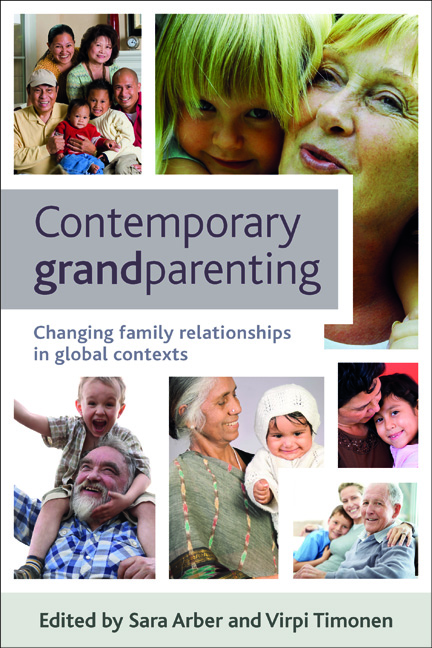two - Transformations in the role of grandparents across welfare states
Published online by Cambridge University Press: 01 September 2022
Summary
Introduction: the many images of modern grandparenthood
In many European countries, grandparenthood is now receiving a great deal of media attention. Reporters want to know if we as social scientists observe new patterns in grandparenting, and they ask what we know about grandparent roles. It is not easy to provide simple answers, but we often respond that grandparents must be seen in several types of societal contexts: cultural, demographic and structural. In considering structural conditions, it is essential that we examine laws and social policies. As sociologists, we are convinced that considerations of contemporary grandparenthood, to a much greater extent than has been the case so far, must be based on a macro perspective, with a focus on how societal context shapes expectations and behaviour. Until the last decade or so, there had been no major comparative studies of grandparents across western societies.
In this chapter, we concentrate on two aspects of societal contexts: demography and social policy. Up until quite recently, culture was most commonly the focus of researchers, and many publications during the second half of the 20th century stressed that there were no clear cultural guidelines for modern grandparenting. Most past work on grandparenthood in late-modern, urbanised societies has taken a social-psychological, micro perspective, discussing variations in perceptions of grandparenthood and grandparent behaviour across different family contexts. The main unit considered has been the grandparent–grandchild dyad. It has been common to start from an underlying premise that we are dealing with what Burgess (1960) called ‘a roleless role’ or what Rosow (1976) described as a ‘tenuous role’: a social status that does not have clear expectations linked to it. Consequently, it is argued, individuals within families need to negotiate and develop their own styles of grandparenting, depending on personal circumstances and preferences (Neugarten and Weinstein, 1964; Robertson, 1977; Kivnick, 1983; Bengtson, 1985; Cherlin and Furstenberg, 1985). In the 1980s, the second author of this chapter also concluded that in a given society, there are no common role definitions for grandparents (Hagestad, 1985). Today, she is ready to abandon this view, even though it is still common to encounter contradictory images of grandparents, both within and across countries.
- Type
- Chapter
- Information
- Contemporary GrandparentingChanging Family Relationships in Global Contexts, pp. 27 - 50Publisher: Bristol University PressPrint publication year: 2012
- 11
- Cited by



